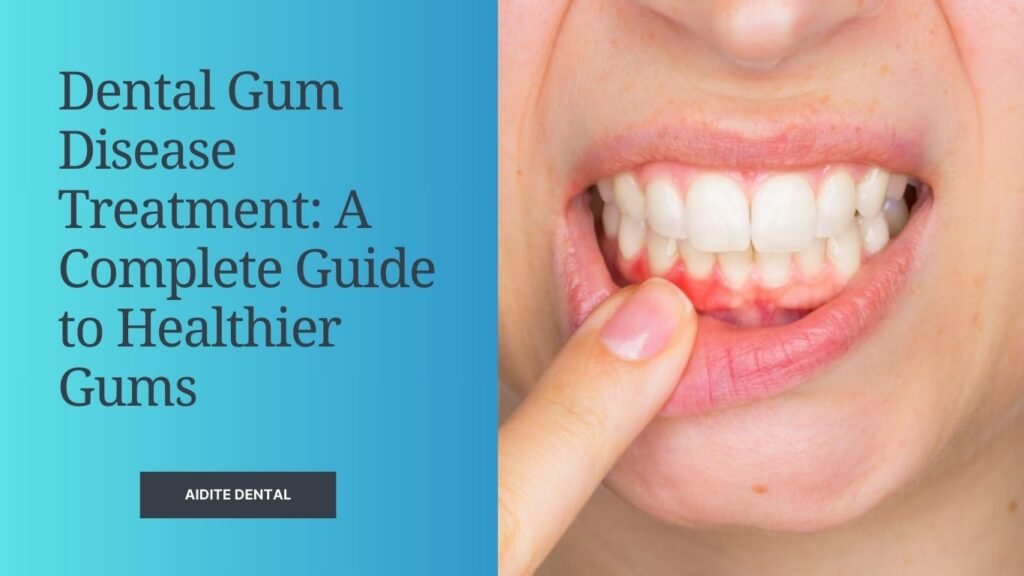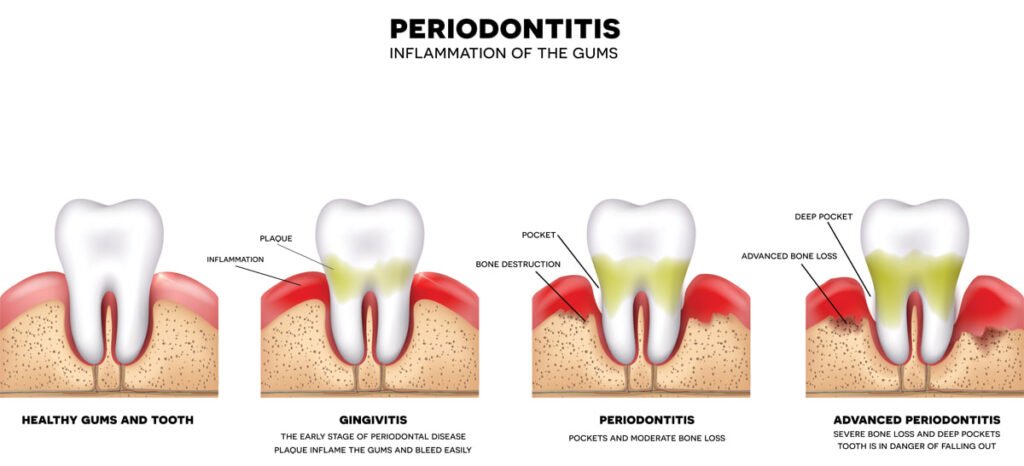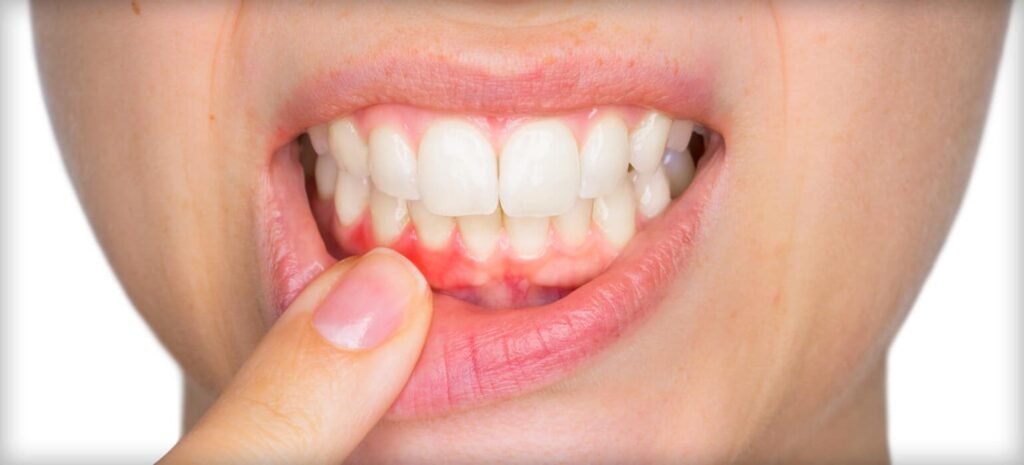Gum disease is a common but serious dental condition that affects millions of people worldwide. If not treated, it can lead to tooth loss, infections, and other serious health conditions. Dental gum disease treatment in dentistry can be anything from preventative care to having advanced treatments, such as non-surgical gum disease treatment and periodontal therapy. Leading dental manufacturers and suppliers like Aidite provide high-quality materials to professional dentists and clinics, ensuring effective gum disease treatment and prevention. Understanding the causes, symptoms, and treatment options can help prevent and manage this condition effectively.

What Is Dental Gum Disease?
Gum disease, or periodontal disease, is an infection of the gums and tissues that surround the supporting tissues of the teeth. This occurs from a buildup of plaque (a sticky film of bacteria) along the gumline. If you don’t remove this plaque with proper hygiene, the bacteria leads to inflammation, which could lead to gum infection and in severe cases, tooth loss.
Stages of Gum Disease
Gum disease has a number of stages, and each one needs to be treated differently.

1. Gingivitis
The most common type of gum disease, gingivitis, results from a build-up of plaque at the gum line. It causes swelling, redness, and bleeding of the gum, and is a type of gum disease that does not result in permanent damage to the bone and tissue that support the teeth. Gingivitis can be reversed with good oral care and non-surgical gum disease treatment.
2. Periodontitis
When gingivitis is left untreated, it turns into periodontitis. This is more aggressive in nature and results in damage to the gum tissue as well as the bone support surrounding it. Deep pockets develop between the teeth and gums leading to outspread of bacteria. It can be treated with periodontal therapy, includingdeeper cleaning, and medicines.
3. Chronic Periodontitis
Chronic periodontitis is the most common form of periodontitis disease, featuring slow progression and inflammation with the receding of gums and slow loss of structures supporting the teeth. But continuous efforts in dental gum disease treatment from dental professionals can minimize the risk factors.
4. Necrotizing Periodontal Disease
This more serious form of gum disease develops when the gum tissue, ligaments, and bone die from a lack of blood supply. This is typically related to immune system disorders, malnutrition, or infections, and it is immediately needed dental gum infection treatment.
How well the dental gum disease treatment works is primarily dependent on how severe the condition is and how early the treatment is started.
Common Causes of Gum Disease
Plaque buildup on teeth is the primary cause of gum disease, although there are several other factors that may also increase the risk of developing gum disease. Poor oral care, lifestyle behaviors, and illnesses will lead gum infection. Here are the common causes of concern regarding dental gum disease treatment:
- Poor Oral Hygiene: Not brushing or flossing regularly can lead to plaque build-up which usually needs dental gum infection treatment.
- Plaque and Tartar Builds Up: Plaque hardens into tartar, which causes gum irritation and increases your need for oral gum disease treatment.
- Smoking and Tobacco Use: Weakens the gum tissue and can delay healing, increasing the chance of periodontal therapy.
- Hormonal Changes: Especially during pregnancy, puberty and menopause gums are more sensitive than usual and prone to dental gum disease treatment.
- Diabetes and medical problems: This reduces your physique to fight infections that may increase the condition to non-surgical gum disease treatment.
- Poor Nutrition: Without the right vitamins, gums become weak, leading to gum disease prevention concerns.
- Bruxism or Teeth Grinding: Putting too much pressure on teeth can aggravate gum disease, which may require periodontal therapy.
Good oral hygiene and regular dental check-ups are key to gum disease prevention.
Signs and Symptoms of Gum Disease You Shouldn’t Ignore

Gum disease begins with mild symptoms that can escalate over time if not treated. Getting attention earlier and knowing these things in advance will help you seek the correct dental gum disease treatment. Following are the typical symptoms:
- Reddish, Inflamed gums: inflammation and tenderness are early symptoms of a gum infection that requires dental gum infection treatment.
- Bleeding Gums: When you brush or floss and blood comes out, that indicates your need for dental gum disease treatment.
- Ongoing Halitosis or Bad Breath: When periodontal bacteria build up, you have bad breath, which can suggest you require non-surgical gum disease treatment.
- Receding Gums: Gums pulling away from teeth expose the roots, which can lead to periodontal therapy concerns.
- Loose Or Shifting Teeth: When the support of the gums weakens, teeth become loose and may start moving, meaning immediate dental gum disease treatment is needed.
- Pain While Chewing: If chewing causes discomfort, then it can be an indicator of possible advanced oral gum disease treatment.
If you begin to notice any of these indications, get gum disease prevention tips and seek professional Dental Care as soon as possible.
Effective Dental Gum Disease Treatment Options
The appropriate dental gum disease treatment often depends on the severity of the existing condition. In general, gum disease in its early stages is treatable with good oral hygiene practices, but in more advanced cases, treatment may be needed by a dental professional.
- Professional Deep Cleaning: At the point when plaque and tartar develop, they are formed under the gum line and will begin to contaminate gum tissues, so scaling and root planing take out these to spare you from periodontal therapy.
- Antibacterial Therapy: Prescription mouthwashes or antibiotics help control bacterial infections in dental gum infection treatment.
- Laser Therapy: Innovative digital dental scans are taken, which allows the doctor to accurately pinpoint any infected gum tissue and provide treatment with maximum comfort.
- Surgical Treatment: Flap surgery, or bone grafting, may be required for oral gum disease treatment in severe cases.
- Home Care and Lifestyle Changes: Good oral hygiene, lifestyle changes, avoiding smoking, and a balanced diet are key aspects of gum disease prevention.
Maintaining healthy gums and avoiding periodontal disease
Prevention is the best way to avoid the need for dental gum disease treatment. Follow these essential steps to maintain good oral health:
1. Brush and Floss Daily
- Use fluoride toothpaste and brush twice per day.
- Try to floss on a daily basis, which removes plaque between the teeth and also prevents dental gum disease treatment.
2. Use an Antimicrobial Mouthwash
- Decrease bacteria, preventing the need for oral gum disease treatment.
3. Maintain a Healthy Diet
- Avoid sugary foods that contribute to plaque buildup.
- Eat a balanced diet with plenty of vitamins for gum health.
4. Regular Dental Checkups
- Dentist professionals know how to get rid of stubborn plaque and tartar.
- Identifying gum disease at an early stage allows for immediate dental gum disease treatment.
5. Quit Smoking
- Smoking increases the risk of periodontal therapy and delays healing.
- One more benefit of quitting smoking is having healthier gums.
Aidite: Advancing Dental Periodontal Surgery Solutions
Aidite is a trusted leader in dental periodontal surgery solutions that create reliable materials and advanced tools for everyone. Every Procedure: From periodontal treatment surgery and dental bone grafting surgery to oral implant placement surgery, Aidite is precise and effective on every operative because different only need to follow different protocols and find.
Learn more about the Aidite Official website to discover innovative dental solutions. Finally, take a look on Aidite specialized materials, more conducive to periodontal treatment of dental bone grafting.
FAQs
Q1. What is the most effective treatment for gum disease?
Dental gum disease treatments vary, and accuracy will depend on the level of severity. This may necessitate deep cleaning, antibiotics, or periodontal therapy.
Q2. Is there a non-surgical cure for gum disease?
Yes, mild dental gum infection treatment can be managed well with proper oral hygiene habits and a deep cleaning.
Q3. How can I prevent gum disease?
Key to gum disease prevention is having regular dental check-ups, brushing and maintaining good oral hygiene, and eating a healthy diet.
Q4. Does smoking make gum disease worse?
Smoking does weaken the immune system and makes healing slow, meaning that it may be necessary to increase the need for oral gum disease treatment.
Summary
Effective dental gum disease treatment ranges from non-surgical gum disease treatment options like deep cleaning to advanced periodontal therapy. Gum disease can often be prevented or managed with the right care, early intervention, and professional dental treatment.
Aidite is the leading manufacturer and supplier of dental materials, which helps professionals carry out proper periodontal therapy so that dental gum disease is treated successfully. Their innovations enhance treatment outcomes and facilitate lasting protection against gum disease. Good gums and a great smile can be achieved if you practice good oral hygiene and visit your dentist regularly.



